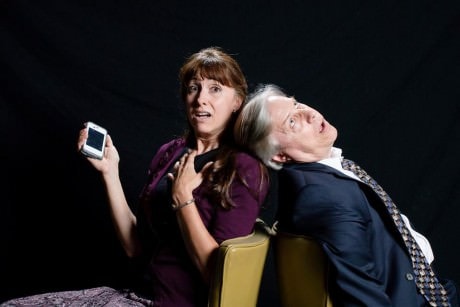We have entered the era where if something is ringing you must answer it. This time the ringing is Colonial Players calling with word of their final production of season 65, Sarah Ruhl’s Dead Man’s Cell Phone. This is one phone call worth answering, and you’ll be kicking yourself in the pants for days if you miss it. Directed by Tom Newbrough, this witty six-person comedy is a zany ride through the life of one woman who chooses to answer the incoming calls from a dead man’s cell phone.

A modern setting, particularly one as vague as ‘the present’ in a non-descript location, can prove challenging for designers. Costume Designer Christina McAlpine manages to create outfits for each of the characters in a sense that augments their quirky personality’s through the clothing that they wear. The melodramatic matriarch is fitted with an outrageous patterned dress and garish red formal suit, not to mention the assortment of hideous fox and minx fur stoles draped around her figure. The mysterious woman appearing in her trench coat has an alluring vixen’s appeal to her because of the strappy red sling-back pumps and black seam stripe running up the back of her stockings. McAlpine helps to shape the characters into existence through her wardrobe designs; a unique approach to highlighting some of the more comic aspects of Ruhl’s characters.
Sound Designer Richard Atha-Nicholls creates a sensational fusion of realistic soundscapes, which often underscore actual shifts in scenic locations— like the funerary music upon entering the church scene, the grousing and carousing sounds entering the pub scene, and the turbo engines entering the airport scene—creating an air of authentic aural atmosphere. These sounds of reality are juxtaposed against the surreal dreamscape music played during the scene changes, wherein the stage goes dark and furniture is sneakily hoisted about. Occasionally these spacey tunes, similar to those that might be found in a planetarium exhibit, are a symbolic precursor for a scene’s location like the scene that takes place in the heavenly hell of a limbo.
Director Tom Newbrough works the intimate space with exceptional ease. The blocking for the show runs quite smoothly, even the scene changes move efficiently. The actors never take up more space than needed while simultaneously moving about in a fashion that feels natural. Newbrough uses the minimalist design approach to the setting to keep the focus of the play on the story that the actors are telling. The one minor technicality that comes to mind is the letter-drop moment in the stationary story during the first act. While written into the script, the execution is clunky and awkward— a mass of letters and papers inexplicably falling in a clump from nowhere just as the lights are fading the scene out to darkness. This particular moment, meant to be a symbolic representation, needs to be adjusted so that it doesn’t appear to be an awkward mishap or malfunction of the set.
The story is really Jean’s (Heather Quinn) to explore and experience. She is the woman who answers the calls of the dead man and digs herself further and further into a hole as she goes. Quinn plays the character without a great deal of enthusiasm, which would be an acceptable choice if there were something with which she was replacing that energy. The quirkiness of the character, as indicated in her dialogue, is lacking and overall her performance is a bit aloof and out of focus.
The rest of the production is acted exceptionally; the nuances and quirks of these peculiar and curious characters are played out fantastically. Hermia (Jean Berard) is the wife of the recently departed. At first she appears to be a few cards short of a full deck, but her drunken scene in the pub is hysterical and grounded in the harsh reality of her character’s unfortunate marriage. Other Woman (Darice Clewell) is a knockout upon arrival, sounding and acting a bit like ‘deep throat’ from the Watergate scandal. Clewell embodies the essence of a film noir ingénue but with a sassier edge; a parody of some enigmatic woman of the night wrapped up in a black and white crime drama.

Dwight (Nick Beschen) is the neglected brother of the deceased. With few lines but much to respond to, Beschen’s character becomes a mostly silent reactionary; his facial expressions telling us volumes about his personality. During moments of interacting with his mother, Mrs. Gottlieb (Mary Fawcett Watko) Beschen wears the expression of a thoroughly scolded child, despite being an aging and grown man. His timid interactions with Jean are priceless, particularly when he attempts to braid her hair or steal a kiss. Watko, as the melodramatically inclined mother of the deceased, is laugh after laugh as she carries on with her theatrics. Her prim nature and ridiculous antics when it comes to her notion of grieving and accusing culminates into a zany and brilliantly laughable performance that is thoroughly enjoyable at the peak of over-the-top character acting.
Gordon (Jim Reiter) steals the show. While the show is about his character there is precious little stage time for the deceased character, not counting the first scene wherein his corpse sits lifeless in the café. Reiter gives a genuinely grounded, almost rapturous monologue at the top of second act that is the epitome of theatrical expression. The entire monologue is delivered with bite and intention; Reiter having a commanding stage presence that has every eye in the audience captivated by what he has to say. He lands jokes, makes points, and invites the audience into his words without diminishing the fourth wall. This story becomes a real moment in time, relived as if he were experiencing it for us for the first time. When his physicality and voice change toward the end of the scene it is emotional disturbing to experience. A rousing performance all-round, despite his limited two-scene appearance, Reiter brings the story home on a relatable note to all.
Running Time: 1 hour and 45 minutes, with one intermission.
Dead Man’s Cell Phone plays through June 28, 2014 at The Colonial Players of Annapolis— 108 East Street in Annapolis, MD. For tickets call the box office at (410) 268-7373 or purchase them online.




